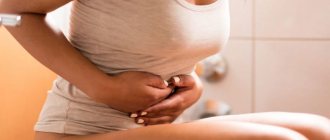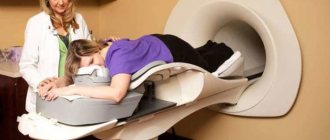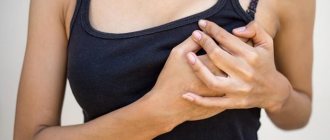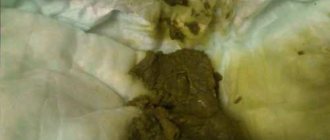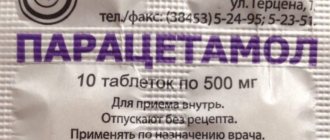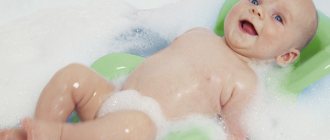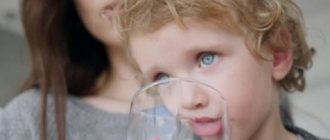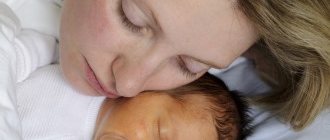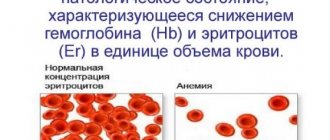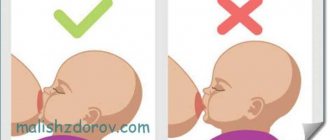In every young family, with the birth of a baby, a lot of troubles arise. Many mothers, noticing that the baby is sweating during feeding, feel anxious. Should such features of a child’s body really cause concern, or is the appearance of droplets of sweat a normal phenomenon?
All causes of sweating can be divided into 2 large groups. Some of them do not have a negative effect on the child’s body, while others, on the contrary, are signs of disease.
Features of sweating in infants
Most often, babies' heads become covered with sweat, while the whole body remains dry. In almost all cases, this is a completely normal process that does not indicate the development of pathologies in the child.
Sweat glands in newborns act immediately after birth, despite the fact that during this period they are not yet fully formed. For this reason, the baby sweats not only in his sleep, but also during eating, active pastime or rest.
Normalization of the functioning of the sweat glands occurs only at the age of 5–6 years, so you should not worry about the fact that the little one’s head sweats even when he is cold.
High indoor temperature
If a mother feeds her child in a very warm room, then sweating in the child cannot be avoided. On the one hand, the baby is straining to get milk, and on the other hand, it is stuffy in the room. The air temperature in the room should not be higher than 23 degrees, and the humidity level should not be 40-70%.
During sleep, the baby will also sweat if he falls asleep in a room at high air temperatures.
To avoid overheating of the child, you must follow the recommendations:
- Set the room temperature acceptable for the baby. In the summer, you need to frequently ventilate the rooms and wipe the floors with a damp cloth. In winter, you should not set the temperature in your living room to high.
- It is not recommended to put a lot of clothes on a child. Focus on what you yourself are wearing and how you feel.
- Frequent trips outside will only benefit the baby. Walk as much as your time and weather allow.
- Do not overuse your exposure to the sun. This threatens not only overheating, but also an overdose of vitamin D.
Causes of head sweating in newborns
As mentioned earlier, in most cases, sweating is a normal physiological process that occurs due to the following reasons:
- Fatigue caused by a long period of wakefulness. In such a case, children are capricious. Due to tension and crying, their temples and the back of their heads may sweat. Once the baby is finally in the crib and falls asleep, the head will dry out.
- The use of things made from synthetic fabrics. It has long been known that such matter does not allow air to pass through. Experts recommend using only clothes and linen for infants made from natural materials, for example, linen and cotton. Many mothers do not follow this rule and buy their children attractive, bright little things, which are presented in a huge range on the modern market. Most of them are made from artificial fabrics.
Natural items of clothing, of course, lose in appearance. Young parents often choose exactly those things that are pleasing to the eye, without thinking that they are harmful to children's health. The baby's body breathes, and things that do not allow air to pass through disrupt this process, causing sweating.
- Down bedding. All relatives try to surround the baby with only the best, this also applies to pillows and blankets. Products made from natural fluff will seem like an excellent option to many, but not everyone knows that fluff can create a greenhouse effect. This explains the fact that the awakened baby is all wet from sweat.
- Various diseases. During the development of colds, there is a decrease in immunity, an increase in temperature, weakness, and an increased level of sweating. Moreover, the greatest amount of sweat is released on the crown and temples. Adults know from their own experience about such features that indicate a cold.
- Overheat. The baby needs warmth. Many mothers constantly think that the baby is freezing, because he cannot yet talk about his feelings. Parents try to wrap the baby as securely as possible in warm clothes, especially in anticipation of a walk in the fresh air. This causes most babies to suffer from heat rash. Some areas of their body are covered with small red spots. When sweating on the head, such spots appear in the neck area.
- Physical exercise. The baby’s body is subjected to such stress when it eats. The baby tries so hard while suckling that he may even sweat. Often it is the head that is involved in the process of sweating in the youngest children.
The reasons listed above explain why a baby’s head sweats. When this happens due to natural features, there is no need to worry. It is enough just to eliminate the factors affecting the baby, and the discomfort will disappear. To prevent your baby's head from sweating, you should choose high-quality bedding and clothing made from natural materials.
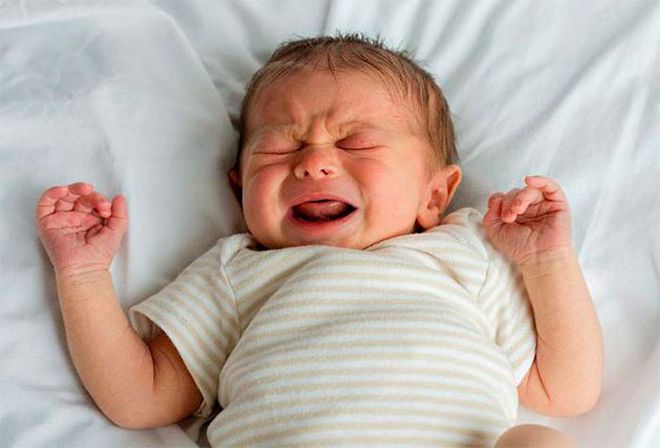
Disorders of the nervous and cardiovascular systems
Why does a baby's head sweat during feeding? In children who have not yet turned three years old, mothers notice the following symptoms:
- the child does not fall asleep well;
- gets tired quickly;
- attention is impaired;
- hyperactivity;
- The baby sleeps restlessly, often wakes up and screams.
Nervous excitability can cause increased sweating, which is not always curable with medications. Herbal remedies and adherence to a daily routine help to quickly cope with this problem.
Pathologies of the heart and blood vessels are difficult to identify in children under one year of age. Signs of the disease, in addition to a sweaty head, include the following:
- The baby cries in his sleep without waking up and becomes covered in sweat.
- Lack of appetite and lethargy.
- Rapid, uneven breathing.
- Blueness in the area between the lips and nose.
- Shortness of breath occurs even with minimal physical exertion.
If parents observe this in their child’s condition, they should definitely visit a pediatrician.
When is sweating on the head really dangerous?
If a child's head sweats during feeding, this may be the first signal of the development of a disease such as rickets. This disease is very dangerous for children. As a rule, its manifestation is associated with a lack of vitamin D, which is necessary for the formation of many systems and organs in infants.
A severe or prolonged deficiency of this vitamin leads to irreversible consequences, including bone deformation.
If a child sweats while eating, this does not indicate the presence of rickets. If you have the slightest suspicion or concern, you should consult a doctor.
Experts determine rickets by external signs:
- cranial bones become thinner or softer;
- the parietal and frontal tubercles increase in size;
- the child’s growth is far behind the norm;
- the so-called “rachitic rosary” appears;
- the first teeth erupt late;
- muscle tone decreases.
All of the above symptoms can raise suspicions about the development of the disease only if they are complex. Diagnosis includes additional examination:
- X-ray of knee joints;
- a blood test that will show the amount of vitamin D, as well as phosphorus and calcium in the body.
It is worth noting that sweating during feeding does not yet give rise to a specific diagnosis. Rickets is quite rare today, although a few decades ago the opposite was true. Often the disease arose in connection with early weaning of babies. If a newborn is fed breast milk, then this disease almost never manifests itself. Together with this essential substance, he receives all the substances necessary for normal development, including vitamin D.
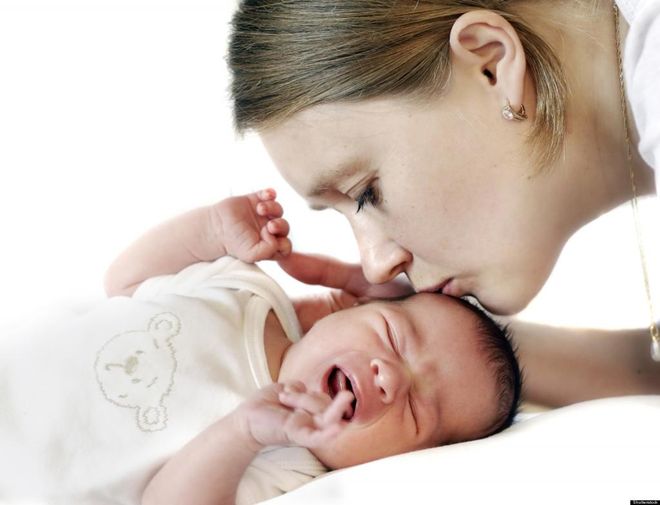
Solving the problem of excessive sweating
Having ruled out possible non-medical factors that may cause your baby to sweat intensely at night, you should consult a doctor on this issue. It is important to pay attention to which area of the child sweats the most - the diagnosis will depend on this.
If your head is sweating
When a child's head sweats after intense physical activity or after playing and jumping, this should not frighten parents. This reaction of the body is absolutely normal. True, sometimes the reason for the appearance of sweat on the hair and head is completely different circumstances.
Mothers may notice that their baby's head sweats a lot during sleep. There is no need to worry, this is just a protective reaction of the body to possible overheating. It is much more dangerous for infants than for adults.
Here's what you need to do to avoid this:
- you should not wrap your baby up, even if you think he is not feeling well;
- the room needs to be maintained at a comfortable temperature; it is recommended to sleep with the window slightly open;
- materials of clothing and bed linen must be natural;
- there is no need to wear a hat indoors; a cap is the only possible option, and only as a last resort.
If your hands and feet sweat
Often mothers, having taken off their baby’s shoes after a walk, find that his feet are wet. What's the first thing that comes to mind at this moment? My legs don't breathe. This is absolutely true. Artificial materials of shoes, socks or tights provoke increased sweating in the legs.
Ways to relieve your baby from sweating palms and feet:
- washing hands and feet with water and soap, drying them thoroughly;
- using powder or talcum powder;
- daily change of socks and tights;
- increase your consumption of foods rich in vitamin D and calcium.
If your child's feet and palms sweat a lot, you can try to solve the problem with regular hygiene procedures.
Sweating during feeding
Does the baby sweat during feeding and does this bother the mother? There is no need to worry. There is no reason to suspect the presence of diseases or bad heredity. Bottle and breastfeeding is hard work and requires a lot of effort. When sucking, all the facial muscles actively work and the child really gets tired of this process, so he sweats.
You can alleviate the situation as follows:
- The room should be ventilated before feeding;
- do not cover the baby’s head with a hat before feeding;
- for meals, dress your one-month-old baby in light, comfortable clothes made from natural materials (more details in the article:);
- If you plan to hold your baby in your arms while he eats, choose light, non-synthetic clothing for yourself.
Never treat your baby yourself, especially with medications. You can find out why your child’s head or other parts of the body are sweating from a pediatrician, who will prescribe the necessary tests and examinations. Only after this will a qualified doctor be ready to make a diagnosis and begin treatment.
Coffee grounds scrub
27.08.2020
Knitting for girls (sweatshirts, pullovers) Mk sweater for girls with zipper knitting needles
21.08.2020
Knitting slippers for beginners - ideas, step-by-step instructions, photo ideas
21.08.2020
What to do if the baby sweats during feeding?
If your baby sweats when breastfeeding, pay attention to the temperature in the room. Optimal values should not exceed 22 degrees, humidity – at least 50%.
The home should be ventilated more often, especially in the summer; in winter it is recommended to use devices that humidify the air.
Do not over-bundle your child or put extra clothes on him. New mothers should continue breastfeeding until the required period. Sucking milk will protect the baby from the development of numerous diseases and strengthen the immune system. Mothers should be careful about what they themselves eat. Nutrition should be balanced, healthy and varied. When your baby is healthy, you should definitely take daily walks in the fresh air.
If your child sweats when he eats, do not panic and go to the doctor immediately; pay attention to other causes that contribute to sweating. Perhaps it is they who cause such uncomfortable features. If this does not help, and the wet head of your daughter or son worries the parents, you should contact a qualified specialist. The pediatrician will examine the baby, conduct a diagnosis and explain exactly what caused the sweating.
